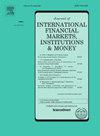主权债务成本与经济复杂性
IF 6.1
2区 经济学
Q1 BUSINESS, FINANCE
Journal of International Financial Markets Institutions & Money
Pub Date : 2025-01-31
DOI:10.1016/j.intfin.2025.102121
引用次数: 0
摘要
本文研究了一个国家的经济复杂性如何影响其相对于美国的主权收益率利差。经济复杂性指数每增加一个单位,10 年期收益率利差就会减少约 61 个基点,但对于 3 年以下的期限,这种影响并不显著,反而会影响利差曲线的斜率。利用因果机器学习和预测模型,经济复杂性是与通货膨胀和制度因素并列的首要预测因素。本文探讨了经济复杂性降低主权风险的机制,强调了其在生产率、产出、收入稳定性和财政危机可能性方面的作用。本文章由计算机程序翻译,如有差异,请以英文原文为准。
Sovereign debt cost and economic complexity
This paper investigates how a country’s economic complexity impacts its sovereign yield spread relative to the U.S. A one-unit increase in the Economic Complexity Index reduces the 10-year yield spread by about 61 basis points, though this effect is non-significant for maturities under three years, affecting the spread curve slope. Using causal machine learning and predictive models, economic complexity is a top predictor alongside inflation and institutional factors. The paper explores mechanisms through which economic complexity reduces sovereign risk, emphasizing its role in productivity, output, income stability, and the likelihood of fiscal crises.
求助全文
通过发布文献求助,成功后即可免费获取论文全文。
去求助
来源期刊
CiteScore
6.60
自引率
10.00%
发文量
142
期刊介绍:
International trade, financing and investments, and the related cash and credit transactions, have grown at an extremely rapid pace in recent years. The international monetary system has continued to evolve to accommodate the need for foreign-currency denominated transactions and in the process has provided opportunities for its ongoing observation and study. The purpose of the Journal of International Financial Markets, Institutions & Money is to publish rigorous, original articles dealing with the international aspects of financial markets, institutions and money. Theoretical/conceptual and empirical papers providing meaningful insights into the subject areas will be considered. The following topic areas, although not exhaustive, are representative of the coverage in this Journal. • International financial markets • International securities markets • Foreign exchange markets • Eurocurrency markets • International syndications • Term structures of Eurocurrency rates • Determination of exchange rates • Information, speculation and parity • Forward rates and swaps • International payment mechanisms • International commercial banking; • International investment banking • Central bank intervention • International monetary systems • Balance of payments.

 求助内容:
求助内容: 应助结果提醒方式:
应助结果提醒方式:


